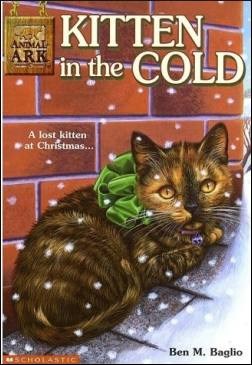NEWS RELEASE
SAULT STE. MARIE SOCIETY FOR THE PREVENTION OF CRUELTY TO ANIMALS
************************* Observant motorist saves kitten from the cold
An observant motorist in the Black Road/Second Line area can be credited with saving the life of a four-month-old kitten.
The concerned driver called the Humane Society to say she had spotted a kitten in the Strathclair area that appeared to be suffering ill effects from the severe cold temperatures.
The Humane Society officer responded and found the kitten with her face down in a field of waist deep snow.
Thankfully she responded to the officer’s calls and shakily made her way over to her.
The officer placed her in her jacket and rushed her back to the shelter.
Her fur was matted with snow and she was shaking violently, but she was very receptive to our attempts to warm her.
After more than an hour of wrapping her in warmed blankets and hot water bottles, the shaking subsided.
She was placed in a heated kennel where she eagerly licked at some food, then groomed herself and is now comfortably resting.
She is still a little unsteady on her feet and shows some signs of frost bite to her ears.
The Humane Society reminds pet owners to protect their pets from the possible dangers of exposure to cold weather and encourages the public to report concerns to the shelter at 949-3573.
A “Winter Dangers” fact sheet follows.
Any questions can be directed to Cindy Ross at 949-3573 or [email protected]
************************* Keep them warm! If it’s too cold for you to go outside, it’s too cold for your pet!
Winter’s chill affects animals, just like it affects people.
Every year we investigate numerous complaints about animals left unprotected from winter weather.
Exposure to harsh conditions can cause serious illness or death to animals, particularly during periods of freezing rain and rapid temperature fluctuations.
Canada’s laws require that animals receive adequate shelter and care.
The society’s investigators offer custodians advice for proper animal care; and if necessary, they remove animals to relieve their distress and provide proper care.
Wilful failure to provide adequate shelter could lead to prosecution and a fine, jail sentence or prohibition from having custody of animals.
The basics
Animals shouldn’t be left outside for extended periods in winter, but most dogs enjoy playing in the snow with their human companions.
Sick, old or short-haired dogs should wear a coat or sweater to protect them from frostbite.
After a winter walk, wipe your dogs’ feet with a damp cloth.
Chemical salts on pavement and roads can irritate both cats’ and dogs’ sensitive paws and can be harmful if ingested.
An alternative for dogs is to purchase boots, now available at pet supply stores.
Most animals require extra calories during cold weather to maintain a comfortable body temperature.
Please speak with you veterinarian about adjusting your animal’s diet accordingly.
Snow does not provide outdoor animals with adequate water; extra care must be taken to ensure that drinking water is always available.
Ethylene glycol poisoning
Ethylene glycol, found in antifreeze and brake fluids, is deadly to all animals.
It tastes sweet, so animals may ingest it; a very small amount can be fatal.
Emergency veterinary care is essential.
Always clean up any spills carefully and dispose of the rags as hazardous waste.
And be alert for antifreeze spills when out on walks.
Farm animals
Farm animals must be sheltered from wind and precipitation such as snow and rain.
In the absence of an adequate barn, the Sault Ste. Marie & District SPCA strongly recommends a three-sided, roofed structure facing away from prevailing winds and containing clean straw bedding.
Outdoor dogs
It’s sad that many of these sociable animals are kept outside.
While the Sault Ste. Marie & District SPCA strongly recommends bringing your dog indoors, dogs who live outside require adequate shelter, increased amounts of quality food and clean drinking water.
As a minimum, an appropriate doghouse must be soundly built of weatherproof materials, facing away from prevailing winds.
The dog house should be elevated and insulated, with a door flap and bedding of straw or wood shavings.
For guidelines, ask for the Ontario SPCA pamphlet, Ideal Doghouse for Ontario’s Outdoor Dogs.
Cat safety The Sault Ste. Marie & District SPCA recommends that cats be kept indoors.
In cold weather, stray and outdoor cats may seek warmth under vehicle hoods, resulting in needless injuries and deaths from fans and fan belts.
Please make a point of knocking on the hood of your vehicle or sounding the horn before starting the engine.
This will warn away any cats who may be hiding in your vehicle. *************************
